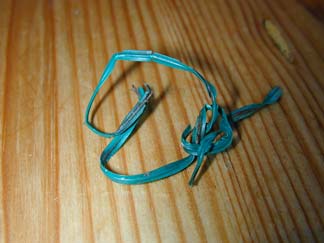
Nadine Gill
Providing
food that is both nutritious and safe is the goal of every responsible tortoise
or turtle keeper, but, sometimes, beginning keepers find out about the possible
dangers too late.
A member recently told us
the tragic story of a juvenile sulcata tortoise that was fed a rinsed head of
supermarket produce fastened at the base with the green plastic tie pictured
here. The sulcata ingested it, and by the time it was discovered by the owner,
irreparable damage had been done. The tortoise was taken to the animal
hospital, but because of the extent of the injuries, the veterinarian
determined there was nothing that could be done and so, sadly, the young
tortoise was euthanized.

Danger hidden in supermarket produce!
We also receive calls from
keepers whose animals have been poisoned by ingested slug pellets, rat and
mouse poison, weed killer, and other pesticides, as well as toxic plants. These poisons have resulted in the death of
many tortoises and turtles, and great care should be taken that an animal never
has access to them.
Many keepers supplement
with supermarket produce when natural graze is unavailable. Various
agricultural pesticide residues can be on store produce as well, and thorough
rinsing is therefore advised. Yet, when in a rush to feed their animals, some
keepers will forego rinsing store produce, thinking it is quite safe to do
so. Standards regarding agricultural
pesticides do vary, but they are generally based on what is considered safe for
human consumption. So, the possible
short and long term effects of feeding unwashed supermarket produce to reptiles
that are not only far smaller, but are often totally herbivorous, should be a
serious concern. To prevent tragic and needless deaths from poisoning and
ingestion of foreign objects, or the continuous ingestion of low-level
pesticide residue, we suggest the following precautions:
If you move to
a new house, carefully inspect the ground when setting up pens for your
animals, particularly if the area had previously been used as a garden. If you
have an opportunity to speak to the previous owner about where any toxic
pesticide or weed killer may have been used, do so.
Be aware of which plants are toxic, and ensure that
your animals do not have access to any that may be growing on your property. A
list of poisonous plants can be found in the Tortoise and Turtle Feeding
Manual.
Inspect all store produce carefully and remove any twist ties
or plastic ties before storing in the refrigerator. Be aware that these ties
come in a variety of styles and colors - including green, which may not be
readily noticeable against green-leafed produce.
Before feeding your
animal any supermarket produce, separate all leaves in the head of lettuce or
greens and rinse them well. Concentrations of pesticide may gather at the base
of the head of produce.
If you discover that your tortoise or turtle is ill and think that it may have been
poisoned, take it to a vet without delay. Minutes can count. Also bring the
item that you suspect could have been the cause with you, and any packet or
container, if possible.
There are standard treatments for many common poisons, and this will allow the specific poison to be identified and for your pet to have a better chance of recovery. These poisons are usually well known by veterinarians, who routinely encounter animals that have accidentally ingested them. Possible symptoms of poisoning include vomiting, foaming at the mouth, weakness and lethargy.
© Nadine Gill/Tortoise
Trust 2002